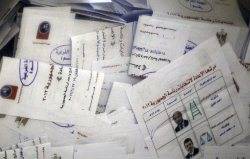Officials have postponed declaring a winner in Egypt's disputed presidential election, sending political tensions soaring as the country awaits its first new leader in three decades.
Adding to the confusion and uncertainty on Wednesday were conflicting reports about the health of Hosni Mubarak, who is serving a life sentence for failing to stop the killing of protesters in the uprising that ousted him last year.
At one point on Tuesday, he was said to be near death, while some believed the report was a pretext by sympathetic allies of Mubarak to transfer him out of prison to a more comfortable facility.
Last weekend's runoff election was long touted as a landmark moment, the choice of Egypt's first civilian president to take over the generals who have ruled since Mubarak's removal on February 11, 2011.
Instead, it has turned into a confrontation between the Islamists of the Muslim Brotherhood and the entrenched elements of Mubarak's old regime, including the military.
Thousands of Muslim Brotherhood supporters, along with some youth revolutionary groups, camped out Wednesday night in Cairo's Tahrir Square, the birthplace of last year's uprising, and denounced the military, trying to push back against a series of power grabs by the generals last week.
The Election Commission did not say when it would announce the winner of the runoff between the Muslim Brotherhood's candidate, Mohammed Morsi, and Mubarak's former prime minister, Ahmed Shafik.
Both candidates claim they won, and the commission was supposed to declare the top vote-getter on Thursday.
But its secretary-general, Hatem Begato, told the state newspaper Al-Ahram that the winner would be announced on Saturday or Sunday.
Allegations of fraud
The commission said the announcement was postponed because a panel of judges must look into about 400 complaints of voting fraud submitted by both campaigns, including lawyers for Shafik claiming “fraud” in 14 of Egypt's 27 provinces.
The lawyers said ballots sent to polling centers were already marked for Morsi.
Morsi's lawyers accused Shafik of buying votes and being involved in forging lists of registered voters to include soldiers, who are barred from voting, and names of the dead.
The Brotherhood says it is being targeted by an organized campaign to keep it out of the presidency, and that even if Morsi is declared the victor, he will face deep resistance that will make it impossible for him to govern.
After two days of voting that ended on Sunday, the group declared Morsi won 52 per cent of the vote. Shafiq's camp on Monday announced he had won 51.5 per cent of the vote.
A group of independent jurists known as the Judges For Egypt said Morsi was the winner, with a similar proportion to the Brotherhood's count.
Foreign and local election monitors say the runoff was not marked by enough serious or large-scale irregularities to question its validity.
Power play
In a series of swift moves last week, the generals cornered for themselves sweeping powers that effectively subordinate the next president and severely limit his capability for independent action.
A court order dissolved parliament, which was led by the Brotherhood, and the military issued a constitutional declaration that makes the generals the nation's legislators and gives them control of the budget.
They will dominate the security system after reshaping a key National Defense Council to keep it under their control.
The generals will also oversee the process of writing Egypt's new constitution.
The Brotherhood had raised alarm when it and other Islamists tried to pack an earlier attempt to form an assembly to write a constitution with their members, giving them the strongest voice in writing it. The assembly was dissolved by a court order.
Allies of the military, Mubarak-era officials and secular opponents of Islamists also hold sway in the judiciary, the prosecutor's office and the election commission.
The resulting standoff has worried Washington, which has long had close ties to Egypt's military and provides it around $1bn a year in aid.
Secretary of State Hillary Rodham Clinton said the US expects the military to "support the democratic transition, to recede by turning over authority".
"The military has to assume an appropriate role, which is not to try to interfere with, dominate or subvert the constitutional authority," she said.
Privately, US officials expressed concern that a Shafik victory could have dangerous fallout, with protests and ensuing instability that could lead the military to take even stronger measures.
PHOTO CAPTION
Ballots for Egypt's presidential elections are seen in a ballot box at a polling station in Cairo June 17, 2012.
Al-Jazeera


 Home
Home Discover Islam
Discover Islam Quran Recitations
Quran Recitations Lectures
Lectures
 Fatwa
Fatwa Articles
Articles Fiqh
Fiqh E-Books
E-Books Boys & Girls
Boys & Girls  Ramadan
Ramadan Fatwa Audios
Fatwa Audios Month of Mercy
Month of Mercy Women
Women Eed Al- Fitr
Eed Al- Fitr Food Recipes
Food Recipes Videos
Videos

 Prayer Times
Prayer Times












